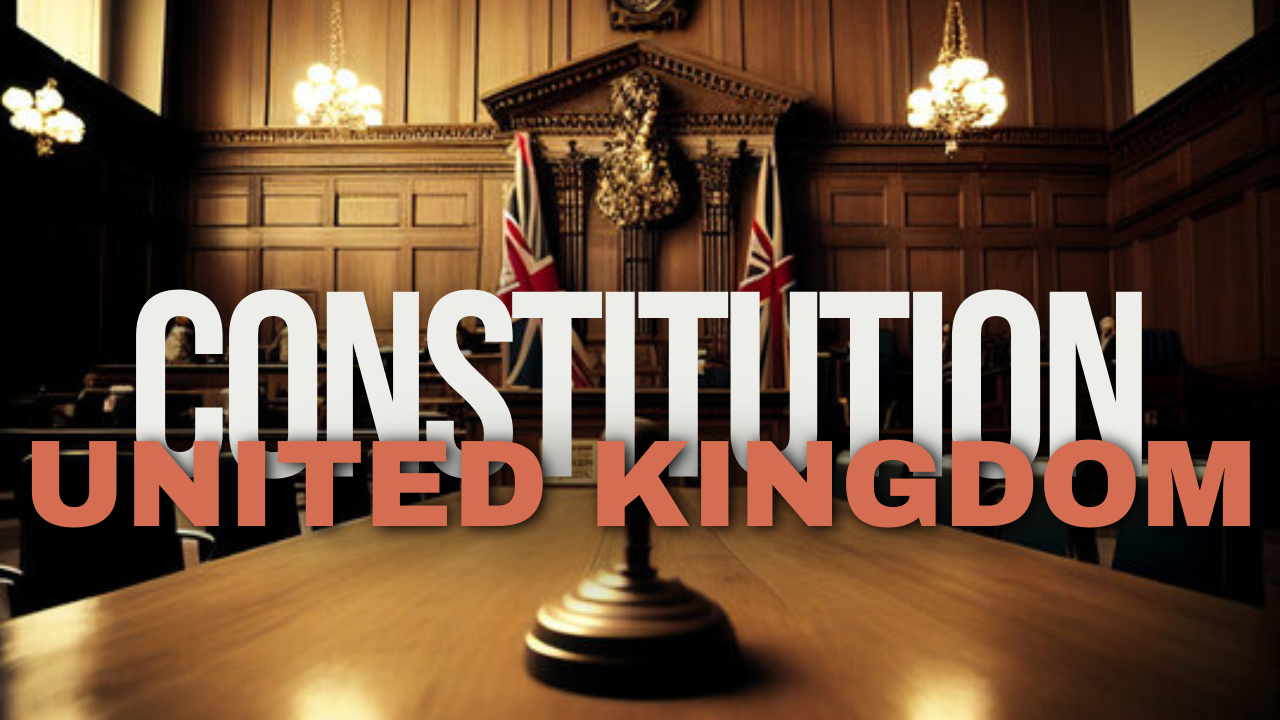
Constitution of The United Kingdom, UK
The British constitution outlines the rights and duties of citizens. The constitution is essentially the guidelines that oversee the UK’s government, to protect against abuses of power. It is uncodified and comes from a variety of sources, whereas most constitutions are codified into one document.

Features of the UK Constitution:
- It is un-codified. This means that there is no single written document which outlines the UK’s constitution.
- It is not entrenched. This means that the constitutional laws are as flexible as ordinary law. Constitutional laws and rules may be enacted, amended or repealed by Parliament using its ordinary legislative procedures.
- It is unitary. This means that the power is concentrated in one single institution, which is Parliament. This means that the legal and political processes that occur are more transparent and easily understood by the population.
- Parliamentary sovereignty is a fundamental principle of the UK constitution. It means that Parliament is the supreme legal authority, and it can create or end any law. No Parliament can pass laws that future Parliaments cannot change.
- The UK is a constitutional monarchy with a hereditary monarch as the head of state. However, the monarch’s powers are largely ceremonial, and the day-to-day affairs of the government are managed by elected officials.
- The rule of law is a foundational principle in the UK constitution. It means that everyone, including the government and the monarch, is subject to the law. Courts have the authority to review the legality of government actions.
SOURCES OF UK CONSTITUTION
- Statute law is one of the primary sources of the constitution. These are also known as Acts of Parliament as they are written law that has passed through parliament. Not all Acts of Parliament are part of the constitution, but those that govern the way the political system is set up and functions, and also those that determine the rights of the people, are constitutional.
- Common law is another important source of the UK constitution. This is the precedent set by judges who make decisions on cases where the statute law isn’t clear or in cases where how statute law should be applied isn’t clear. These rulings set precedents for later judges to make decisions.
- Conventions are a source of the UK’s constitution which are based on unwritten customs and practices. These are not legally binding but they are widely accepted. These can be quite easily changed by an Act of Parliament. An example of a constitutional convention is that the UK government will not, except in an emergency, order military action without getting permission from the parliament. The Prime Minister should be a member of the House of Commons able to command the confidence of that institution is only a convention.
- Authoritative works are pieces published by academics of politics and law, who have commented on the law and how the UK should adopt it. These are relevant documents that serve as guides as to how the government should act but they do not have legal force. The political journalist, Walter Bagehot, writing in the nineteenth century, helped shape the conception and operation of a constitutional monarchy.
- The final source of the UK constitution is international law. This includes treaties and written agreements made between the UK and other countries. Once signed they are scrutinised by parliament, and if accepted, become law, holding influence over statute law. One of the more important parts of international law that contributed the constitution was European Union Law. But, as of the 31st of January 2020, the UK is no longer part of the EU and therefore this law no longer applies.
TIMELINE OF UK CONSTITUTION DEVELOPMENT
| Document | Impact |
| Magna Carta | The first is the Magna Carta which was drawn up and signed in 1215. This is the first document that put the monarch under restrictions, and therefore the first document to resemble a constitutional piece of writing. It guaranteed political liberties to ‘free men’ making sure that the King could not abuse his powers and establishing individual rights. |
| Bill of Rights | The 1689 Bill of Rights created a constitutional monarchy in England. It established free elections and the right to regular parliaments. It also guaranteed gave freedom of speech within parliament (Parliamentary Privilege). |
| The Act of Settlement | The 1701 Act of Settlement gave Parliament the power to decide on the line of succession to the throne. |
| Acts of Union | This legislation, enacted in 1707, united the parliaments of England and Scotland. The parliaments remained united until the UK parliament devolved some legislative powers to Scotland in 1997. |
| Parliament Act 1911 | This act reinforced how parliament is run, determining the roles of both the House of Commons and the House of Lords. |
| European Communities Act 1972 | This act set out that if there was a contradiction between European Union law and UK law, European law would be prioritised. This was repealed with the European Union Act 2018. |
The UK Parliament
Governments are formed out of Parliament and must have the support of a majority of the House of Commons, known as the ‘confidence’ of the House of Commons. The United Kingdom Parliament has two chambers, the House of Commons and the House of Lords. The United Kingdom Parliament may pass laws on any matter, without restriction in law.
- THE HOUSE OF COMMONS: The House of Commons is the First Chamber of the United Kingdom Parliament. It has 650 directly elected members, known as Members of Parliament. Members are elected by a simple majority system, also known as First Past the Post.
The main functions of the House of Commons are:
- To represent the people of the United Kingdom in all matters;
- To hold the government to account;
- To scrutinise and approve Bills as part of the legislative process;
- To authorise taxation;
- To scrutinise and approve the Government’s budget and planned expenditure on an annual basis;
- To debate the public policies of and for the Government of the United Kingdom.
- To hold Government to account
2. THE HOUSE OF LORDS: The House of Lords is the Second chamber of the United Kingdom Parliament. It is composed of Life Peers, 92 Hereditary Peers and 26 Lords Spiritual.
The main functions of the House of Lords are: To hold the government to account; To scrutinise, amend and approve bills as part of the legislative process. The House of Lords has no power to veto legislation approved by the House of Commons, save to veto any Bill which seeks to extend the life of a Parliament beyond 5 years.
The UK Executive
The term ‘executive’ refers to the government: those who make the key decisions and run the country day to day. In the UK system, the party with the most seats in the House of Commons is typically invited to form a government. The Prime Minister is the Head of the United Kingdom Government.
The Head of State appoints as Prime Minister the member of the House of Commons who can command the confidence of the House of Commons.
The Prime Minister remains in office until either:
- Following a General Election, the Prime Minister is no longer able to command the confidence of the House of Commons, or
- The Government loses a vote of no confidence in the House of Commons and a replacement government cannot be found within 14 days, or
- The Prime Minister resigns
The Cabinet
The Cabinet consists of the Prime Minister and senior Ministers and is the collective leadership of the United Kingdom Government. Ministers must be members of either House of Parliament and are appointed and dismissed by the Head of State, acting on the advice of the Prime Minister. The maximum number of holders of ministerial office entitled to sit and vote in the House of Commons at any one time is ninety-five.
Powers of the Executive The Executive exercises powers based on an Act of Parliament, the common law or convention. The common law powers of the Executive include, but are not limited to:
- Declaring war and committing troops to armed conflict
- Signing treaties and international agreements
- Granting passports
- Issuing pardons
- Most legislation is introduced to Parliament by the government, which to a large extent controls the agenda and time of the House of Commons.
- The government proposes an annual budget which sets out how it will spend money over the coming year.
- The government also has the discretion to make a broad range of policy decisions in areas such as transport, education and health.
- The executive also holds other powers, called Royal Prerogative powers. These are the powers that are in theory attached to the monarch, but are now in practice largely exercised by the government. They can be used without having to get consent from Parliament. They include powers to conduct foreign policy, including conducting diplomacy and deploying the army, to grant honours, and to prorogue Parliament (which means to end its current session). These powers have often been controversial, as there are limited checks and constraints on their use by the executive
The Prime Minister and Minsters are responsible to Parliament for the exercise of these powers.
HEAD OF THE STATE
- The Head of State of the United Kingdom is the hereditary Monarch.
- The powers of the Head of State are formal, ceremonial and non-political, and include:
- Granting assent to legislation approved by both Houses of Parliament;
- Appointing the Prime Minister;
- Appointing Ministers of the Crown;
- Granting honours and titles;
- And any other powers as may be accorded to the Head of State.
The Head of State must act with strict political neutrality. The Head of State exercises these powers on the advice of the Prime Minister.
The UK Judiciary
The Supreme Court is the UK’s final court of appeal for all civil cases and for criminal cases in England, Wales and Northern Ireland. It also hears constitutional cases and ones that have the most far-reaching consequences for the public. The Constitutional Reform Act 2005 provided for the establishment of a UK Supreme Court. It started sitting in October 2009.
- In 2009, the Supreme Court began work in its refurbished building in Middlesex Guildhall, on the corner of Parliament Square.
- The judiciary is independent and impartial.
- Ministers must uphold the principle of judicial independence.
- There are separate courts systems in England and Wales, Scotland and Northern Ireland.
- The most senior court in the United Kingdom is the United Kingdom
- Supreme Court. The Supreme Court is the final court of appeal on all matters, except criminal appeals in Scotland.
THE UK BILL OF RIGHTS
The following rights, deriving from the European Convention on Human Rights (1950) and expressed in the Human Rights Act (1998), are available without qualification to all person within the United Kingdom:
- Everyone has the right to life;
- Everyone has the right to be free from torture, inhuman or degrading treatment;
- Everyone has the right to be free from slavery and forced labour;
- No-one may be found guilty of a criminal offence if their actions did not amount to a criminal offence under national or international law at the time of their commission.
The following rights, deriving from the European Convention on Human Rights and expressed in the Human Rights Act, which may be qualified by law are available to all persons within the United Kingdom:
- The right to liberty and freedom from arbitrary arrest and detention;
- The right to a fair trial;
- The right to respect for private and family life, home and correspondence;
- The right to freedom of thought, conscience and religion;
- The right to freedom of expression;
- The right to freedom of assembly and association;
- The right to marry and found a family;
- The right to peaceful possession of property;
- The right to education;
- The right to take part in free and fair elections, held at regular intervals
Process of Legislation in British Parliament
- First Reading:
- The process begins with the introduction of a bill, which can originate from the government or individual Members of Parliament (MPs).
- The bill’s title and main objectives are presented, but there is no debate at this stage.
- The bill is then printed, and copies are made available to members.
- Second Reading:
- This is the first opportunity for MPs to debate the general principles and themes of the bill.
- A vote is taken at the end of the debate to determine whether the bill should proceed to the next stage.
- If the majority agrees, the bill moves to the committee stage.
- Committee Stage:
- The bill is examined in detail by a committee of MPs. This can be a Public Bill Committee or, for more important bills, the Committee of the whole House.
- Amendments to the bill can be proposed and debated during this stage.
- The committee scrutinizes each clause and schedule of the bill.
- Report Stage:
- The committee reports back to the House with any amendments made during the committee stage.
- MPs who were not involved in the committee stage can suggest further amendments.
- Each amendment is debated and voted on.
- Third Reading:
- This is the final opportunity for the House to debate the contents of the bill. However, the debate is focused on what is actually in the bill, rather than what might have been included.
- Members discuss the final text of the bill as amended in the committee and report stages.
- A final vote is taken, and if the majority is in favor, the bill moves to the other House.
- House of Lords or House of Commons (Repeat of Stages 1-5):
- The bill goes through similar stages in the other House, including the first reading, second reading, committee stage, report stage, and third reading.
- If the second House makes amendments, the bill returns to the first House for consideration of those changes.
- Consideration of Amendments:
- Both Houses must agree on the final text of the bill. If there is disagreement, the bill may go back and forth between the Houses until an agreement is reached.
- Royal Assent:
- Once both Houses have agreed on the final text, the bill is sent to the monarch for royal assent.
- Once royal assent is granted, the bill becomes law and is known as an Act of Parliament.
Admin at The Pakistan Gazette

